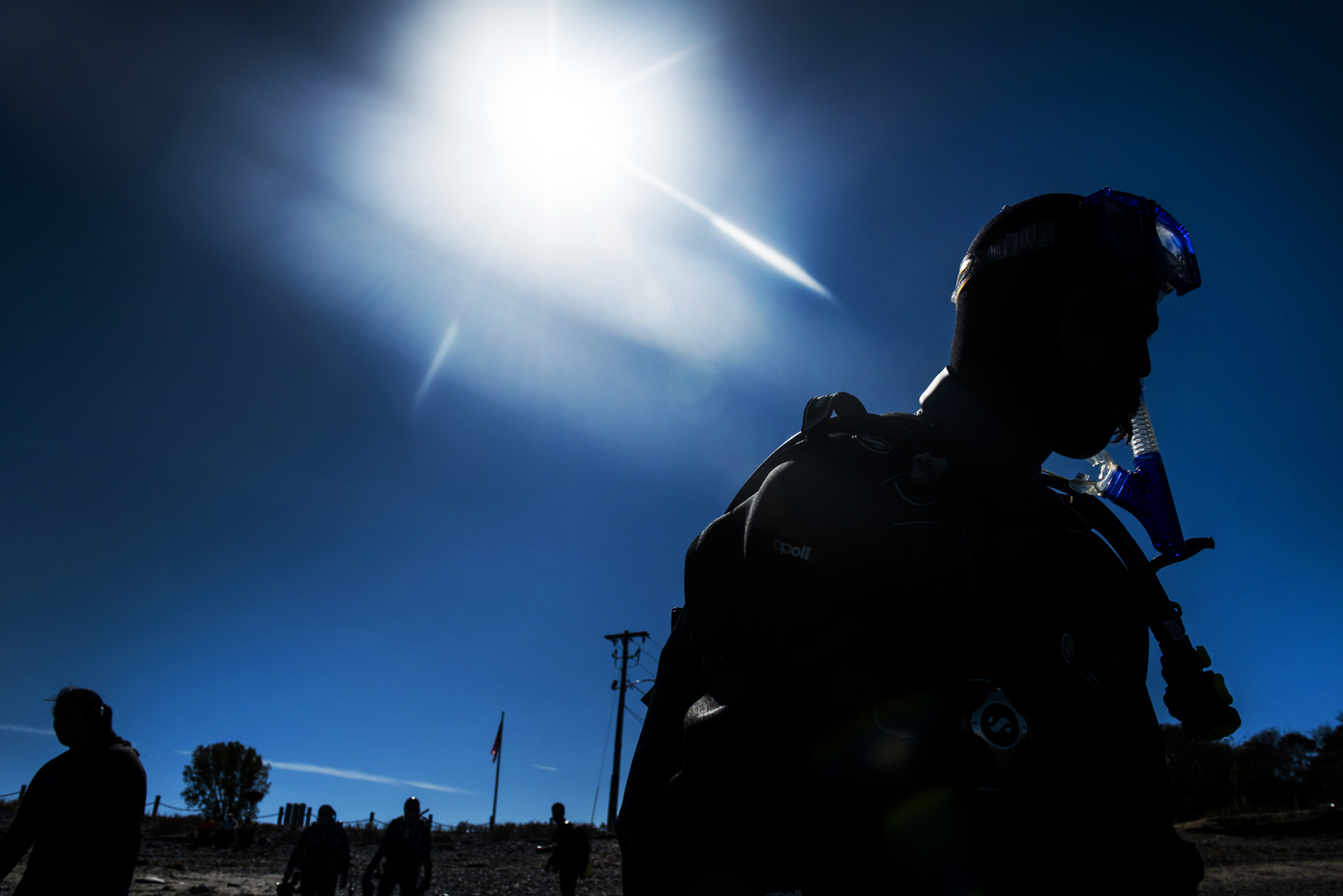Graduates of Three Seas pursue various careers in environmental consulting, non-profit work, state and federal government, outreach and education, and scientific research support. Learn more about some of our program alumni and how their Three Seas experiences helped shape their career pathways.
Liz Allen
Three Seas 34 (2016-2017)
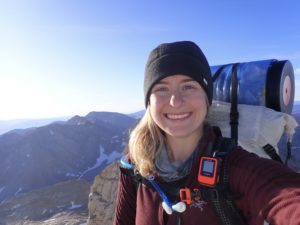 Regulatory Permitting Specialist at WRA, Inc., Freelance Science Writer
Regulatory Permitting Specialist at WRA, Inc., Freelance Science Writer
After finishing her undergraduate degree in Biology at the College of William & Mary, Liz knew she wanted to further her education by studying marine biology in graduate school. Liz chose the Three Seas Program to broaden her knowledge of marine systems and refine her research interests. At the time, Liz expected to go on to a PhD after finishing the Three Seas Program. Instead, she discovered a different career path in marine biology that she really enjoys–working as an environmental consultant and science writer.
Upon graduating from the program, Liz accepted a research technician position at Sonoma State University with Dr. Sean Place, one of her Three Seas professors. As a result, she had the opportunity to expand her molecular skillset and travel to Antarctica to research fish physiology. Liz then took her molecular and managerial experience to work for Nobel Prize-winning scientist Dr. Jennifer Doudna.
Now back in marine systems, Liz works as an environmental regulation specialist and eelgrass lead at a small company in Northern California. She is in charge of conducting eelgrass surveys, coordinating with major environmental agencies, and writing biological reports. In addition to her ‘day job’, Liz works as a freelance science writer. Liz’s writing covers marine research, environmental regulations, and conservation initiatives and has been published by Forbes, Scientific American, and TreeHugger. For her writing, Liz has interviewed leading voices such as Three Seas alum Dr. Austin Gallagher, renowned wildlife photographer Cristina Mittermeier, and Alexandra Cousteau, Jacques Cousteau’s granddaughter.
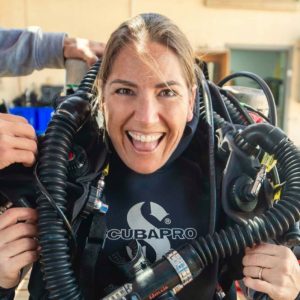
Dr.Gretchen Goodbody-Gringley
Three Seas 18 (2001-2002)
Three Seas Professor, Biology of Corals, Director of Research at the Central Caribbean Marine Institute
Gretchen’s year in the Three Seas Program was one of the most rewarding times of her career. As a student, she found the program to be challenging and engaging both academically and personally. In addition, it was a time of growth for Gretchen, where she began to learn who she was and what she wanted to do with her career.
The most memorable moments of the program for Gretchen were underwater, playing with nudibranchs and putting starfish on their heads in Friday Harbor, and diving amongst pillar corals and staghorn corals at Dairy Bull in Jamaica. But the relationships are what stand out the most and have lasted a lifetime. In Friday Harbor, Gretchen remembers sitting on the cliffs with her classmates and watching the orcas swim past and searching for puffins with their binoculars. In Jamaica, they would have Friday night domino sessions at the local jerk stand; and in Nahant, they would venture into Boston to see concerts or go to public lectures. But she did not just form relationships with her fellow students; some of Gretchen’s closest collaborators are her former Three Seas instructors. The network of friends and colleagues that Gretchen made during Three Seas made the program such a pivotal part of her career.
After Three Seas, Gretchen was offered a research technician job with Dr. Ken Sebens, the former Director of the MSC in Nahant and one of the program’s professors. She was able to travel with Dr. Sebens to several field sites, including Bermuda. During this position, she became fascinated with the island of Bermuda and its northerly coral reef system. As a result, she decided to pursue a PhD investigating genetic connectivity between Bermuda and the Caribbean. Gretchen completed her PhD at Harvard University in 2009 and then took a postdoc position at Mote Marine Laboratory. She held a second postdoc position at the Bermuda Institute of Ocean Sciences before receiving a fellowship to study at the University of Bologna for a year, investigating the population demography of a Mediterranean coral. Upon finishing in Italy, Gretchen rejoined BIOS as an Assistant Scientist, leading the Reef Ecology of Evolution Laboratory from 2014 – 2020. In January 2020, Gretchen became the Director of Research at the Central Caribbean Marine Research in the Cayman Islands, where she is responsible for developing the research and education programs at the institution. Gretchen maintains her connection to the Three Seas Program in her capacity as a professor and internship advisor. She fosters an environment of learning for Three Seas students by sharing her advice, experiences, and expertise.
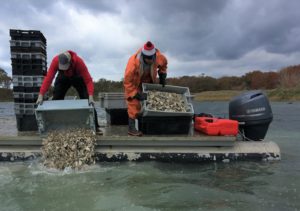 Pat Barrett
Pat Barrett
Three Seas 32 (2015-2016)
Principal Biologist, Rhode Island Department of Environmental Management: Division of Marine Fisheries
The Three Seas Program came at a pivotal moment in Pat’s early career when he was exploring options for the next steps. Moving away from his private-sector position, Pat started looking into master’s programs. Three Seas delivered the immersive learning experience, and community Pat was looking for. He gained the knowledge needed to execute marine research and exposure to and advice from professors, grad students, and marine professionals across all three of the program’s locations.
Pat has since used his experience and connections to launch a career in state government at the Rhode Island Division of Marine Fisheries. As a Principal Biologist, Pat focuses on habitat monitoring and restoration projects within RI state waters and leading the Narragansett Bay Quahog Dredge Survey. In addition, Pat utilizes the technical-scientific dive training learned in Three Seas to assist with juvenile lobster surveys, acoustic telemetry program, and eelgrass conservation mooring projects.
Pat credits the mentorship he received from the Three Seas faculty and his master’s research project as playing a big part in where he is today. He has continued to collaborate with the Hughes and Grabowski Labs at Northeastern on ongoing oyster-related research. He has even returned to TA for the program in Nahant and Panama.
In addition to the professional relationships Pat has fostered through the program, he’s also found long-lasting friendships with his classmates. Pat and his cohort regularly hang out to catch up and reminisce about their shared experiences.
Mark Losavio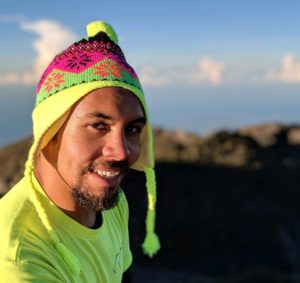
Three Seas 37 (2018-2019)
Media and Outreach Coordinator for the Monitor National Marine Sanctuary, NOAA
Mark graduated from the University of South Carolina in 2014 with a BS in Marine Science. While there, he was an active member of the school’s community—forming their SCUBA Club, sitting on the Diving Control Board, and leading the Marine Science Undergraduate Society. Mark worked in various service, research, and outreach jobs, including a year with AmeriCorps, before coming to Northeastern. He believes each experience contributed to his diverse skillset and made him a well-rounded, competitive applicant for graduate school and his future career.
Mark completed the Three Seas Master’s Program with aspirations of a career in science communication. Instead, he chose to incorporate his personal interests and previous training in the Chinese language into his research project, which focused on evaluating the effectiveness of virtual reality in the STEM curriculum in the US and China. After graduating from Northeastern, Mark continued to hone his communication skills assisting the Marine Science Center’s community programming, acting as an ambassador for the Three Seas Program during recruitment, and as a guest on various science and diving podcasts. Mark also worked part-time as a Program Instructor at Kestrel Educational Adventures and volunteered at his local food bank while conducting his full-time job search during the pandemic. Almost a year after graduation, Mark accepted a position with the NOAA National Marine Sanctuaries Office as the Media and Outreach Coordinator for the Monitor National Marine Sanctuary.
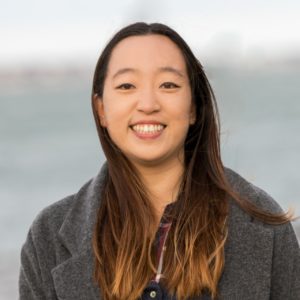
Iris Seto
Three Seas 37 (2018-2019)
Rita Barron Fellow, Charles River Watershed Association
As a student who learns best through hands-on experiences, the accelerated, heavily field-based nature of the Three Seas Program was a great fit for Iris’s learning style. Studying coral reefs, mangroves, and seagrass beds in the classroom and then diving in those habitats later that same day was the highlight of Iris’s experience. In addition to the varied curriculum across the program’s three locations, Iris found the exposure to new field techniques and equipment to be particularly meaningful in contributing to her versatility as a researcher and science diver.
On top of Iris’s learning experiences in the classroom and field, her internship and research project provided insight into what she could do with her degree once she graduated. Iris partnered with the MA Division of Marine Fisheries (MA DMF) to assess the efficacy of conservation moorings in restoring eelgrass along the coast of Massachusetts. This work with the MA DMF Habitat team contributed to a long-term dataset that she then analyzed for her internship project. She is currently working towards submitting her research for publication.
Iris is now a research fellow at the Charles River Watershed Association (CRWA), where she manages over 70 citizen science volunteers for their monthly water quality program and benthic macroinvertebrate program. She also assists the science team with additional projects, such as creating ArcGIS maps to help communities locate ideal locations for implementing green stormwater infrastructure.
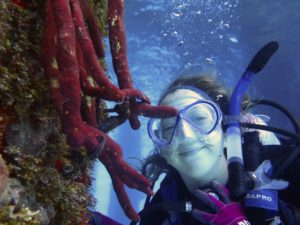
Jeanne Boomberg
Three Seas 30 (2013-2014)
NASEM Gulf Research Program Science Policy Fellow, NOAA RESTORE Science Program
Jeanne was a member of a mixed undergraduate and graduate cohort in 2013-2014. The closeness of her cohort was a big part of Jeanne’s Three Seas experience. She refers to them as her “Three Seas Family,” and they’re just as invested in each other’s successes now as they were during the program. Professionally, the Three Seas network has proven to be incredibly valuable to her. Everywhere she goes, Jeanne meets new people connected to the program and always enjoys hearing about their own Three Seas experiences.
After completing Three Seas and graduating from Northeastern, Jeanne gained a variety of field experiences. She first worked for UCSB SONGS Mitigation Monitoring Program in Carlsbad, CA, before joining The Nature Conservancy’s Coral Restoration Project on St. Croix. Jeanne then came back to Three Seas as a TA, traveling with the cohort to Washington and Panama and offering logistical, diving, and academic support for the undergraduates. In 2018, Jeanne started her M.S. in Oceanography and Coastal Sciences at Louisiana State University with Dr. Dan Holstein studying coral reproduction over depth, emphasizing mesophotic reefs. After graduating in August 2020, Jeanne was awarded the National Academy of Sciences Gulf Research Program’s Science Policy Fellowship. She is currently spending her fellowship year working for NOAA’s RESTORE Science Program to support the long-term sustainability of the Gulf of Mexico ecosystem, fish stocks, and habitats.
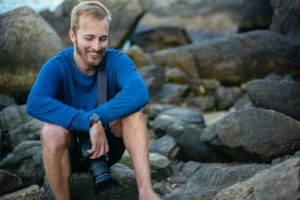
Tim Briggs
Three Seas 33 (2016)
Science Communication Specialist, New Hampshire Sea Grant
Tim was drawn to Northeastern for undergrad by the idea at the core of the Three Seas Program and the university’s mission—experiential learning. His interest in learning more about the underwater world and the prospect of studying three well-established marine labs convinced Tim to participate in Three Seas his sophomore year. Tim remembers the program for its extreme challenges and extreme rewards. Tim credits the advanced coursework, professors, and fellow students to push him to learn and question more, all while he gained the confidence to tackle bigger problems.
Three Seas helped Tim realize his passion for photography and science communication over his research interest. After finishing Three Seas, Tim returned to Northeastern to complete two co-ops—first at the Environmental Defense Fund’s Fisheries Solution Center and then in the College of Science’s marketing and communications department at Northeastern. Following graduation, Tim worked in Seafood Marketing at Massachusetts Division of Marine Fisheries, published work in Alert Diver Magazine, directed a short film for the Conservation Law Foundation, and completed various freelance projects for nonprofits and researchers.
Tim currently works as a Science Communication Specialist for New Hampshire Sea Grant, covering their staff and funded research projects through written, visual, and film pieces. His projects include a film about oyster restoration and COVID relief, a film covering student-built flooding sensors, and a long-form StoryMap covering citizen science beach profiling programs in NH, ME, and CA – which was picked up by NOAA and hosted on both NOAA.gov and Climate.gov.
Andrea Burton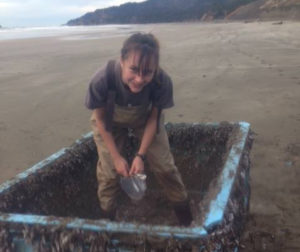
Three Seas 30 (2013-2014)
PhD Student, Oregon State University
After undergrad, Andrea knew she wanted to do something related to marine science but didn’t know exactly what. So she chose the Three Seas Program over a traditional master’s program because it offered various courses to introduce students to subtopics within marine biology.
Three Seas aided Andrea in narrowing down the subject matter she was most interested in pursuing for future research endeavors. Andrea completed the independent research portion of Three Seas with Dr. John Chapman at Oregon State University’s Hatfield Marine Science Center. Andrea connected and developed relationships with several colleagues during her internship, which ultimately led to two job placements after graduation. Andrea returned to OSU to assist with a tsunami debris monitoring project and worked full-time at the USDA profiling lipid content in infested mud shrimp. It was there that Andrea met her initial PhD advisor. She is now a PhD candidate in the Barreto Lab at OSU and is working towards completing her dissertation— “Assessing the adaptive potential of marine invertebrates to climate stressors.” Andrea was also the recipient of a prestigious Fulbright Award to teach English to local communities in Romania during her graduate work.
In addition to the professional connections she fostered during Three Seas, Andrea gained an excellent group of friends who still stay in contact with each other seven years later. Andrea’s cohort created a unique way to stay connected: members of her cohort take turns shipping a symbolic souvenir from their time in Panama to each other, adding photos, knick-knacks, and letter updates to reminisce with each other year after year.
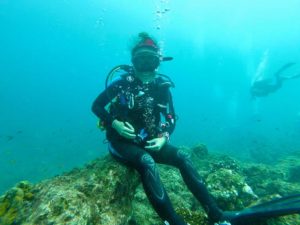 Angela Fan
Angela Fan
Three Seas 37 (2018-2019)
Research Technician, Tufts University School of Medicine
As an undergraduate at Northeastern, Angela joined a master’s cohort of Three Seas students to fit the program into her degree before graduation. She chose the program because it offered exactly what she was looking for: a mixture of fieldwork, lab work, and scientific research. In addition, the foundational knowledge and experiential learning Angela gained through the program helped clarify her future career plans. After graduating from Northeastern and the program, Angela was hired as a research technician and animal care technologist at Tufts University in a lab using zebrafish as a model organism to study human mineralized tissue diseases and bone development. She is excited to develop her genetic, molecular, and animal husbandry skills.
Three Seas was one of the most memorable years of Angela’s life, not only for the research experiences but also for the teamwork aspect. She forged strong bonds with her cohort in a short amount of time. Angela’s favorite memory is of hiking up Volcan Baru in Panama. The overnight hike tested her mentally and physically, drawing on her perseverance, determination, and the support of her classmates to get to the summit for a memorable sunrise.
Laura Goetz 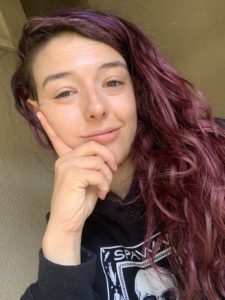
Three Seas 35 (2017)
PhD Student, University of California at Santa Cruz
The Three Seas experience really pushed Laura’s boundaries as an undergraduate student. The intensity and structure of the program shaped Laura’s ability to learn and retain new information at a quick pace. Laura remembers the program as one of the best experiences at Northeastern—one that allowed them to finally dig deep into the material they were interested in, taught by the most passionate instructors they’d ever had. Rounding out the experience for Laura was their classmates, saying, “[it] was really shaped by my cohort and how much fun we had together, especially in Friday Harbor. I was lucky to get to experience this program with the group that I did.”
Even as a high schooler Laura knew they wanted to pursue a PhD in aquatic biological science. Laura was looking for universities that would give them the best chance of getting into graduate school and ultimately settled on Northeastern because of the Three Seas Program. Laura chose the program because they felt the challenge of taking master’s level courses as an undergraduate combined with the hands-on field experience would make them a standout applicant for graduate school.
While finishing their undergraduate career at Northeastern, Laura was accepted into the Ecology and Evolutionary PhD program at UC Santa Cruz and received a National Science Foundation Graduate Research Fellowship. In the third year of their PhD, Laura is studying the genetics behind life history expression in steelhead and rainbow trout.
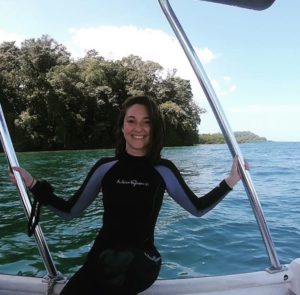
Simi Harrison
Three Seas 37 (2018-2019)
Marine Biologist, Tetra Tech
Simi joined the Three Seas Program as a master’s student in 2018. After graduating with a bachelor’s degree from a small liberal arts school and an aspiration to work in coastal resilience, Simi felt she needed more specialized training to be competitive for positions that appealed to her most. Simi chose the Three Seas Program for its offering of field experience in various marine environments, which helped her hone her research skills without limiting her geographically. Simi also appreciated the freedom students were allowed in the research internship phase.
She completed her Three Seas internship at the Massachusetts Division of Marine Fisheries comparing the productivity of artificial and natural reefs in Nantucket Sound and later published her research in the journal Estuaries and Coasts. She is still in touch with her internship advisor and coworkers from DMF but now works at Tetra Tech, an environmental consulting agency. In her new role, Simi supports federal and private projects in the field and the office. She helps conduct trawl and grab surveys and analyzes towed video data while also supporting benthic and marine permitting sections for the offshore wind team.
One of the lasting impressions of the program for Simi is the people she met along the way. Between professors from the program, researchers at partner institutions, and the program’s vast alumni network, Three Seas has made the marine biology community feel that much smaller for Simi.
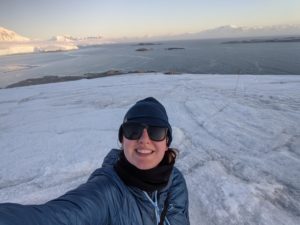 Katie Hudson
Katie Hudson
Three Seas 31 (2014-2015)
PhD Student, University of Delaware
Like many of our undergraduate students, Katie chose to study marine biology at Northeastern because of the Three Seas Program. Earlier high school internships and a marine science summer camp exposed Katie to the concept of learning by doing, a critical component of the Three Seas Program and one that drew her to participate. The program was one of the most academically challenging parts of Katie’s undergraduate degree, but she feels properly prepared for graduate school and beyond. She distinctly remembers her first dive in Panama when a nurse shark swam close by and her first dive in Friday Harbor, going down the dive elevator while the cold water slowly crept into her wetsuit. But one of Katie’s most meaningful memories while on Three Seas was a lecture on internal waves for Ocean and Coastal Processes. The lecture was memorable because of its location—a beautiful remote island on Panama’s Pacific Coast—and because it was one of the first times Katie started to ask questions about how physical oceanography impacts marine ecology, which has now become the broad focus of her research.
The rigor of the coursework and the foundational knowledge she gained helped solidify Katie’s specific interests in marine science. Katie credits Three Seas for helping her land a co-op at Woods Hole Oceanographic Institute studying marine robotics. There she learned how to operate several types of marine robotics and was introduced to an instrument she would use five years later at Antarctica’s Palmer Station. Three Seas was also where Katie first learned to code in R, which is now her primary tool for analysis. Without the base that Three Seas provided, Katie feels she would not be proficient in R and data analysis, valuable skills that will help her for the rest of her career.
Katie is currently a PhD candidate with Dr. Matthew J. Oliver at the University of Delaware. Katie’s research focuses on the physical mechanisms that drive a biological hotspot in Antarctica. She completed a 4-month deployment to Palmer Station on the Western Antarctic Peninsula from November 2019 to March 2020, where she collected most of the data for her thesis. When she is not processing her data in R, Katie also works on deploying autonomous underwater vehicles known as gliders for the Mid Atlantic Regional Association Coastal Ocean Observing System (MARACOOS), of which her lab is a member.
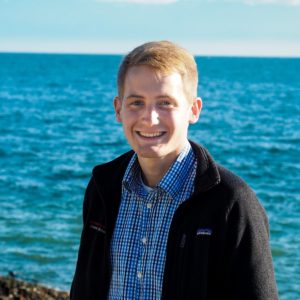
Ben Moran
Three Seas 32 (2015-2016)
PhD Student, Stanford University
As an undergraduate, Ben was convinced he wanted to study marine biology but did not have much practical exposure to the ecosystems where a marine biologist can build a career. So three Seas was an ideal way to get hands-on experience across as many ecosystems as possible.
His year on Three Seas was also full of amazing memories, with some of the best people he met during undergrad. Ben’s cohort quickly bonded during their first semester in Nahant as they got accustomed to working together, learning the basics of statistics, natural history, and ecology that would carry them through the rest of the program.
After his undergraduate degree, Ben took a working gap year to follow up on the connections he had made during Three Seas. First, Ben had a summer fellowship at the Great Lakes Environmental Research Laboratory in Ann Arbor, MI, measuring and visualizing plankton migration patterns for NOAA. Following that, he went to Germany to work with his Fishes professor from Three Seas, Dr. Oscar Puebla. Then, after conducting fieldwork in Belize and Florida, Ben returned to Dr. Puebla’s lab at GEOMAR for analysis and writing. The following winter, Ben came back to Three Seas to work as a TA for the Panama and Washington portions of the program and got a second round of some of his favorite Three Seas memories. Finally, in the Fall of 2019, Ben started his PhD in Dr. Molly Schumer’s lab at Stanford University, studying how hybridization affects evolution in the freshwater fishes of the genus Xiphophorus. His work involves fieldwork in the mountains of Mexico, laboratory experiments on fish behavior and development, and genomic sequencing to explore the molecular roots of evolution.
Three Seas was Ben’s first exposure to molecular ecology, the sub-discipline that’s now his career’s focus. The program also introduced Ben to his research advisor, which facilitated his first peer-reviewed publication, a huge landmark for an early-stage scientist. More broadly, Ben believes Three Seas gave him a breadth of knowledge about the ocean that allows him to engage intelligently with a range of scientists and gave him ideas for projects that he hopes to follow up on in the future. Ben’s classmates in Three Seas became some of his closest friends, and they all keep in touch regularly. He is confident they will continue to do so into the future and is looking forward to having so many great people in his corner as he navigates through academic life.
Kiki Schreiber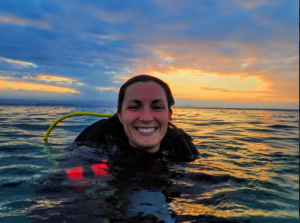
Three Seas 37 (2018-2019)
Data Curriculum Specialist, Billion Oyster Project
Kiki was initially drawn to the Three Seas Program for two reasons. First, she was unsure what field of marine biology she was interested in and was not ready to zero in on a particular subject. The Three Seas Program offers courses ranging from Marine Botany to Coastal Sustainability to Molecular Marine Ecology, so Kiki felt she could gain a good understanding of a variety of subjects and then choose what she was most interested in for her independent research. The second reason Kiki was drawn to Three Seas was the travel component. Kiki was intrigued by the opportunity to dive regularly in three unique locations. However, what stands out most to Kiki now that she’s completed Three Seas is the immersive nature of the program—spending lengthy periods of time in the field and underwater to observe and apply what students learn in the classroom.
Three Seas coursework made Kiki confident in her abilities as a scientist and communicator. In addition, the program helped Kiki focus on her career aspirations and figure out the people and professional groups she wanted to connect with. Along the way, she met and still keeps in touch with an amazing friend group from Three Seas 37, and the extended Three Seas family will continue to be a network and resource she can rely on.
Kiki currently works for the Billion Oyster Project as their Data Curriculum Specialist. Billion Oyster Project restores oysters to New York City waters and works with NYC teachers, students, and community members to collect data from various oyster restoration projects around the harbor. In addition, her job involves incorporating that harbor data into a computer science and data analysis curriculum for middle and high school students, allowing them to ask and investigate scientific questions that they may have wondered during their data collection field experiences.
Photo by Adam Glanzman/Northeastern University.
